Hãy nhập câu hỏi của bạn vào đây, nếu là tài khoản VIP, bạn sẽ được ưu tiên trả lời.

Đáp án D
Thông tin: And yet viewing the main sight of any destination is rarely the highlight of a trip. Mostly it sits there on your itinerary like a duty visit to a dull relative.
Dịch: Tuy nhiên, việc xem cảnh chính của bất kỳ điểm đến nào hiếm khi là điểm nổi bật của một chuyến đi. Chủ yếu là nó ngồi đó trên hành trình của bạn như một chuyến thăm nghĩa vụ đến một người họ hàng buồn tẻ.

Đáp án B
Thông tin: Shattered from getting up at five in order to see Uluru at dawn, I felt empty and bored.
Dịch: Tan vỡ sau khi thức dậy lúc năm giờ để nhìn thấy Uluru lúc bình minh, tôi cảm thấy trống rỗng và buồn chán.

Đáp án D
The prescribed tourist manner (cách thức du lịch theo quy định) = They all eat, drink and do the same things at the sites of the world wonders (Tất cả họ đều ăn, uống và làm những điều tương tự tại các địa điểm trên thế giới kỳ diệu)

Đáp án A
Thông tin: Moby Dick, on one level the saga of the hunt for the great white whale, was also a heavily symbolic allegory of the heroic struggle of man against the universe
Dịch: Moby Dick- cuốn tiểu thuyến trường thiên kể về các cuộc săn cá voi trắng khổng lồ, đồng thời cũng là một câu chuyện ngụ ngôn mang tính biểu tượng về cuộc đấu tranh anh dũng của loài người chống lại vũ trụ.

Đáp án D
Thông tin: He traveled extensively and used the knowledge gained during his travels as the basis for his early novels
Dịch: Ông đã đi chu du nhiều nơi và sử dụng những kiến thức có được từ những cuộc hành trình để làm cơ sở cho những cuốn tiểu thuyết đầu tiên

Đáp án D
Thông tin: So now I've visited four of the “25 Wonders of the World", as decreed by Rough Guides. And I think this will be the last. While in my heart I can see myself wondering enchanted through China's Forbidden City, in my head I know I would be standing grumpily at the back of a group listening to some Imperial Palace Tour Guide.
Dịch: Vì vậy, bây giờ tôi đã ghé thăm bốn trong số 25 Kỳ quan thế giới của Cốt-lô ", theo như sự đồng ý của Rough Guide. Và tôi nghĩ đây sẽ là lần cuối cùng. Tôi biết rằng tôi sẽ đứng gắt gỏng sau lưng một nhóm nghe một số Hướng dẫn viên của Cung điện Hoàng gia.

Đáp án D
Thông tin: Herman Melville, an American author best known today for his novel Moby Dick, was actually more popular during his lifetime for some of his other works
Dịch: Herman Melville- nhà văn người Mĩ nổi tiếng nhất hiện nay với tiểu thuyết Moby Dick, ông càng được biết tới rộng rãi hơn qua một vài tác phẩm khác trong suốt cuộc đời của mình.

Đáp án A
Thông tin: In 1841 Melville set out on a whaling ship headed for the South Seas. After jumping ship in Tahiti, he wandered around the islands of Tahiti and Moorea.
Dịch: Vào năm 1841, Melville bắt đầu chuyến hành trình trên 1 con tàu săn cái voi tiến về vùng biển phía Nam. Sau khi xuống tàu ở Tahiti, ông đã đi lang thang khắp các đảo ở Tahiti và Moorea.
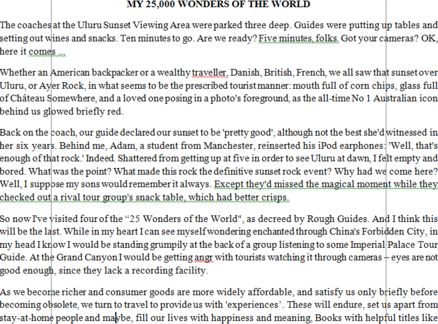


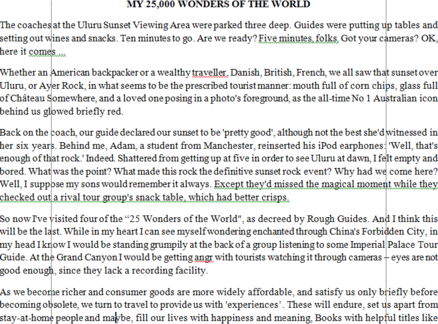


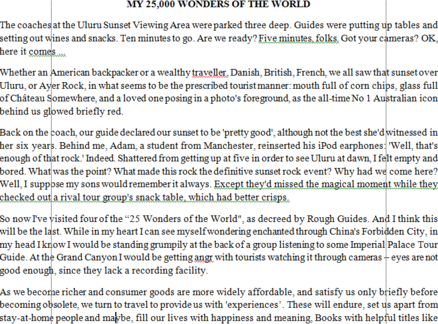


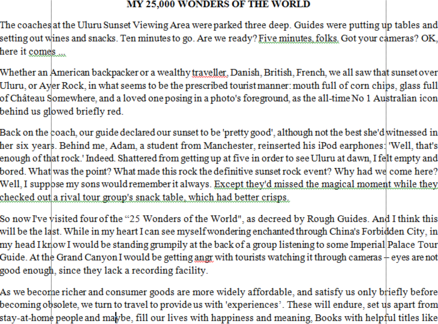


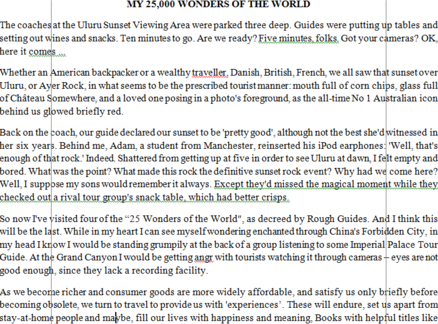


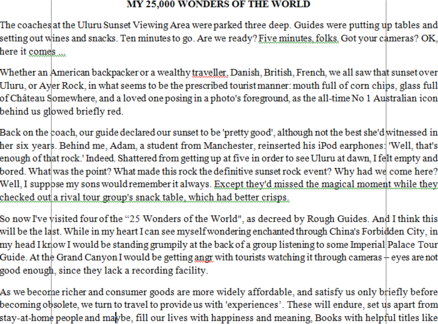


Đáp án C
Thông tin: I'd bet many backpacks on the Machu Picchu Inca Trail are filled with copies, with little tieks penciled in the margins after each must-see sight has been visited.